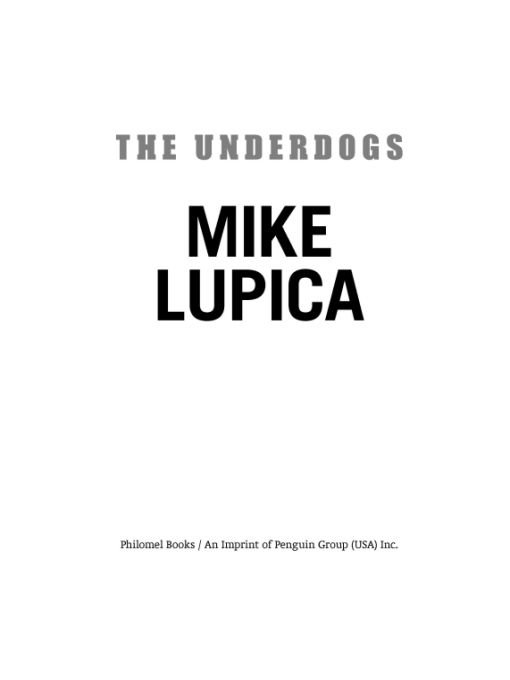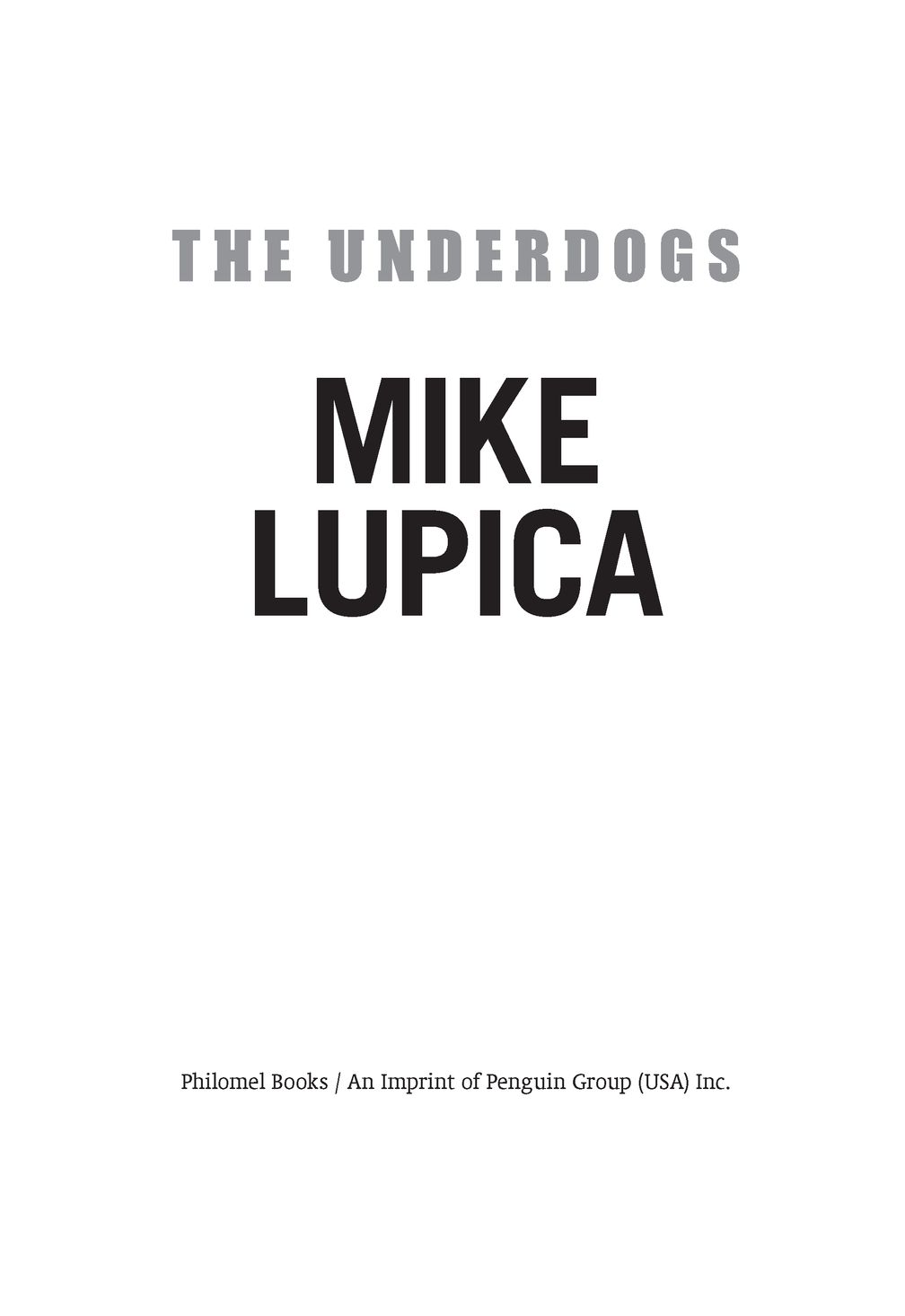The Underdogs




Table of Contents
Â
Â
Â
PHILOMEL BOOKS
A division of Penguin Young Readers Group. Published by The Penguin Group.
Penguin Group (USA) Inc., 375 Hudson Street, New York, NY 10014, U.S.A. Penguin Group (Canada), 90 Eglinton Avenue East, Suite 700, Toronto, Ontario M4P 2Y3, Canada (a division of Pearson Penguin Canada Inc.). Penguin Books Ltd, 80 Strand, London WC2R 0RL, England. Penguin Ireland, 25 St. Stephen's Green, Dublin 2, Ireland (a division of Penguin Books Ltd). Penguin Group (Australia), 250 Camberwell Road, Camberwell, Victoria 3124, Australia (a division of Pearson Australia Group Pty Ltd). Penguin Books India Pvt Ltd, 11 Community Centre, Panchsheel Park, New Delhiâ110 017, India.
Penguin Group (NZ), 67 Apollo Drive, Rosedale, Auckland 0632, New Zealand (a division of Pearson New Zealand Ltd). Penguin Books (South Africa) (Pty) Ltd, 24 Sturdee Avenue,
Rosebank, Johannesburg 2196, South Africa. Penguin Books Ltd, Registered Offices:
80 Strand, London WC2R 0RL, England.
Â
Copyright © 2011 by Mike Lupica. All rights reserved.This book, or parts thereof, may not be reproduced in any form without permission in writing from the publisher, Philomel Books, a division of Penguin Young Readers Group, 345 Hudson Street, New York, NY 10014. Philomel Books, Reg. U.S. Pat. & Tm. Off.
The scanning, uploading and distribution of this book via the Internet or via any other means without the permission of the publisher is illegal and punishable by law.
Please purchase only authorized electronic editions, and do not participate in or encourage electronic piracy of copyrighted materials. Your support of the author's rights is appreciated.
The publisher does not have any control over and does not assume any responsibility for author or third-party websites or their content.
Â
Published simultaneously in Canada.
Â
Library of Congress Cataloging-in-Publication Data
Lupica, Mike. The Underdogs / Mike Lupica. p. cm.
Summary: Small but fast twelve-year-old Will Tyler, an avid football player in the down-and-out town of Forbes, Pennsylvania, takes matters into his own hands to try and finance the city's football team, giving the whole community hope in the process.
[1. FootballâFiction. 2. Community lifeâPennsylvaniaâFiction.
3. PennsylvaniaâFiction.] I. Title. PZ7.L97914Un 2011 [Fic]âdc23 2011011762
Â
ISBN : 978-1-101-53568-4
Also by #1 Bestseller Mike Lupica:
Â
Travel Team
Â
Heat
Â
Miracle on 49th Street
Â
Summer Ball
Â
The Big Field
Â
Million-Dollar Throw
Â
The Batboy
Â
Hero
For my pal Elmore Leonard

ACKNOWLEDGMENTS
As always, my wife Taylor and my four childrenâ
Christopher, Alex, Zach, Hannahâ
inspire me every single day.
Christopher, Alex, Zach, Hannahâ
inspire me every single day.
Â
But I also want to give special thanks
on this book to four others:
on this book to four others:
Gerry Callahan, who shared so much
of his passion for youth football.
of his passion for youth football.
The great Esther Newberg, who imagined
this group of underdogs even before I did.
this group of underdogs even before I did.
And my Mom and Dad.
Just because.
Just because.
CHAPTER 01
J
ust about everybody who'd ever seen Will Tyler play said the same thingâthat he could fly on a football field.
ust about everybody who'd ever seen Will Tyler play said the same thingâthat he could fly on a football field.
He was definitely flying now.
Ball tucked firmly in the bend of his arm, open field in front of him. A slight wind at his back. Not that he needed it.
At midfield he made an effortless cut to his left, switching the ball from his right hand to his left in the process.
Will did it without even thinking, did it on instinct, one more move that nobody had to teach him. Not even his dad, who'd been a star running back in this same town, on this same field.
Back when the field was in much better shape. And the town was, too.
But Will's dad always said that even on his best days, all the way through high school, he was never as fast as Will.
“You've got that gear,” he told Will once.
“What gear?”
“That extra gear that the great ones have,” Joe Tyler said.
Will shifted into that gear now.
Flying, like the wind at Shea Field wasn't just behind him, it was trying to keep
up
with him.
up
with him.
At the thirty he cut back again, back to his right, angling toward the sideline. Switching the ball back to his right hand. Imagining that he was watching himself on one of those giant screens most NFL stadiums have now, pretending he was trying to see if anybody was gaining on him.
Knowing that nobody would be.
Twenty-yard line now.
Fifteen.
Only the end zone ahead of him.
And that's when he went down.
He hadn't been tackled. He'd stepped into a hole at the five-yard line.
He hadn't seen it because he had his eye on the prize, like always. Just felt his right foot go into it, the leg collapsing, like he'd been tripped. Like he'd been caught from behind. Just like that.
Will was mad. The beat-up field at Shea was the only thing that could stop him. And it had. And had cost him a touchdown. Of course he knew it could have been worse, he could have rolled an ankle or hurt his knee the way his dad had once. It had been his senior year in high school. His dad hadn't stepped into a hole, though. He'd just made a cut into the secondary and thought he was about to break into the clear when he got hit by tacklers from both sides, at the same exact moment, their helmets meeting at his right knee.
In so many ways, too many ways for Will to even count, it was a hit from which his dad still hadn't recovered.
Will had gone down hard but knew he was all right, knew he would have no trouble getting back up. The only burn he was feeling now was embarrassment.
The same he'd felt last season after the fumble against Castle Rock.
He sat there, ball under his arm, thinking:
It's a good thing I'm alone.
Alone with his ball, alone on this field, no teammates or opponents there to see him trip and go down, nobody to see somebody this good at football look so bad.
He turned and saw how deep the hole was. One of many at Shea Field, a field that the town seemed to have forgotten, or maybe just given up on, the way it was about to give up on a football team and a football season for twelve-year-olds like Will Tyler.
The town council of Forbes had made it clear a couple of weeks earlier that there wasn't enough money in the budget to finance all the local sports teams, as it had in the past. They'd said that some of the younger age groups might have to suffer so that no programs were cut at Forbes High School. They'd said it was more expensive than ever to finance football teams, telling the parents there had been barely enough in the budget to let Will's eleven-year-old team compete last season in the West River Youth Football League, Forbes's version of Pop Warner. Now unless somebody in town could come up with the money in a few weeks, enough money to cover membership in the league, helmets, uniforms, field maintenance, emergency services, insuranceâwhat Will's dad called “the full boat”âthere would be no football for twelve-year-olds this year.
No team, no practices, no games, no shot at the league title Forbes had come within a touchdown of winning last season.
Maybe, Will thoughtâalone on this field, two yards short of the end zoneâa run like this in an imaginary game would be the only kind he would get to make this year.
CHAPTER 02
W
ill felt as if football was about to leave Forbes the way the sneaker factory had.
ill felt as if football was about to leave Forbes the way the sneaker factory had.
Technically the factory hadn't left, he knew. It was still there on the river, only it was empty now the way it had been for most of Will's life. It was the business that had left, the business that used to make Forbes Flyers, once one of the most famous athletic-shoe brands in the country.
That was before other companies began to dominate the business with cool sneakers of every color, for every sport. And even cooler catchphrases and commercials, with endorsements from the hottest athletes. Those other companies became what his dad called the “superpowers” of the sneaker business, and they had wiped out Forbes Flyers like powerful armies invading a tiny nation.
“It wasn't that Nike or any other others were doing anything wrong,” Joe Tyler told Will once. “They were just selling shoes and giving the people what they wanted. But in the process, it was like they wiped out the world we'd grown up in, the one built around that factory.”
Other books
Now a Major Motion Picture by Stacey Wiedower
The Billionaire's Elusive Lover by Elizabeth Lennox
Susan Squires - [Da Vinci Time Travel] by The Mists of Time
Dark Destiny by Thomas Grave
Sweetness (Bold As Love) by Lindsay Paige
Spike's Day Out by Zenina Masters
Oak and Dagger by Dorothy St. James
Creed by Trisha Leaver
A Thousand Lies by Sala, Sharon
